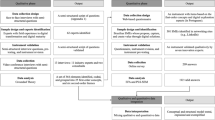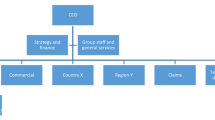Abstract
This article has two principal aims. The first is to reconcile thecompetence based approach to the firm with traditional contractualapproaches, instead of treating them as incompatible. The mainthesis advanced is that firms manage simultaneously competencesand transactions, but they do so in accordance with a specificlexicographic order of priorities. The second aim is to explorein detail the sources of knowledge formation in the firm. Theanalysis privileges anthropological readings which stress the roleof learning – both radical and incremental – within distributed communities of practice.
Similar content being viewed by others
References
Amin, A. and P. Cohendet: 1999, “Learning and Adaptation in Decentralized Business Networks”, Society and Space 17: 87–104.
Aoki, M.: 1986, “Horizontal vs. Vertical Information Structure of the Firm”, American Economic Review 76: 971–983.
Aoki, M.: 1988, Information, Incentives and Bargaining in the Japanese Economy (Cambridge: Cambridge University Press).
Aoki, M.: 1990a, “Toward an Economic Model of the Japanese Firm”, Journal of Economic Literature 28: 1–27.
Aoki, M.: 1990b, “The Participatory Generation of Information Rents and the Theory of the Firm”, in M. Aoki, B. Gustafsson and O.E. Williamson (eds.), The Firm as a Nexus of Treaties (London: Sage), pp. 26–52.
Bessy, C. and E. Brousseau: 1999, “Technological Licensing Contracts: Features and Diversity”, European Review of Law and Economics.
Brown, J.S. and P. Duguid: 1996, “Organizational Learning and Communities-of-Practice”, in M. Cohen and L. Sproull (eds.), Organizational Learning (London: Sage).
Casson, M.: 1998, “An Entrepreneurial Theory of the Firm”, DRUID Conference on Competencies, Governance and Entrepreneurship, Barnholm, June.
Chandler, A.D. Jr.: 1962, Strategy and Structure: Chapters in the History of Industrial Enterprise (Cambridge: MIT Press).
Chandler, A.D. Jr.: 1992, “Corporate Strategy, Structure and Control Methods in the United States During the 20th Century”, Industrial and Corporate Change 1(2): 263–284.
Cohen, M.D.: 1984, “Conflict and Complexity: Goal Diversity and Organizational Search Effectiveness”, American Political Science Review 78: 435–451.
Cohen, M.D.: 1991, “Individual Learning and Organizational Routine: Emerging Connections”, Organization Science 2: 135–139.
Cohen, M.D., R. Burkhart, G. Dosi, M. Egidi, L. Marengo, M. Warglien and S. Winter: 1996, “Routines and Other Recurring Action Patterns of Organizations: Contemporary Research Issues”, Industrial and Corporate Change 5(3): 653–698.
Cohen, M.D., J.G. March and J.P. Olsen: 1972, “A Garbage Can Model of Organizational Choice”, Administrative Sciences Quarterly 17.
Cohendet, P. and P. Llerena: 1991, “Integration and Learning Processes”, in P. Bourgine and B. Walliser (eds.), Economics and Artificial Intelligence (Oxford: Pergamon).
Cohendet, P., F. Kern, B. Mehmanpazir and F. Munier: 1998, “Routines, Structures of Governance and Knowledge-Creating Processes”, in J. Lesourne and A. Orléan (eds.), Advances in Self-Organization and Evolutionary Economics (Paris: Economica).
Cohendet, P., F. Kern, B. Mehmanpazir and F. Munier: 1999, “Knowledge Coordination, Competence Creation and Integrated Networks in Globalized Firms”, Cambridge Journal of Economics 23: 225–241
Coriat, B. and G. Dosi: 1995, “Learning How to Govern and Learning How to Solve Problems: On the Coevolution of Competences, Conflicts and Organizational Routines”, IIASAWorking Paper no. 95-06 Laxenburg (Austria).
Cré mer, J.: 1990, “Common Knowledge and the Co-Ordination of Economic Activities”, in M. Aoki, B. Gustafsson and O.E. Williamson (eds), The Firm as a Nexus of Treaties (London: Sage), pp. 53–75.
Cyert, R.M. and J.G. March: 1963, A Behavioural Theory of the Firm (Englewood Cliff NJ: Prentice Hall).
Dosi, G. and M. Egidi: 1991, “Substantive and Procedural Uncertainty. An Exploration of Economic Behaviours in Complex and Changing Environments”, Journal of Evolutionary Economics 1: 145–168.
Dosi, G. and L. Marengo: 1994, “Toward a Theory of Organizational Competences”, in R.W. England (ed.), Evolutionary Concepts in Contemporary Economics (Michigan University Press).
Eliasson, G.: 1990, “The Firm as a Competent Team”, Journal of Economic Behaviour and Organization 13: 275–298.
Eliasson, G.: 1994, “The Theory of the Firm and the Theory of Economic Growth”, in L. Magnusson, (ed.), Evolutionary and Neo-Schumpeterian Approaches to Economics (Dordrecht: Kluwer).
Favereau, O.: 1989 “Marché s internes, marché s externes”, Revue Economique 2: 273–328.
Favereau, O.: 1993, “Suggestions pour reconstruire la thé orie du salaire sur une thé orie des rè gles”, Working Paper Laetix, University of Paris X, April.
Favereau, O.: 1995, “Apprentissage collectif et coordination par les rè gles: Application à la thé orie des salaires”, in N. Lazaric and J.M. Monnier (eds.), Coordination é conomique et apprentissage des firmes, (Paris: Economica), pp. 23–38.
Frahey and Prusak: 1998, article in special issue of California Management Review on the “Management of Knowledge”.
Fransman, M.: 1994, “Information, Knowledge, Vision and Theories of the Firm”, Industrial and Corporate Change 3: 3.
Gibbons, M., C. Limoges, H. Nowotny, P. Scott and M. Trow: 1994, The New Production of Knowledge (London: Sage).
Hayek, F.A. von: 1937, “Economics and Knowledge”, Economica 4: 33–54.
Hutchins, E.: 1996, “Organizing Work by Adaptation”, in M. Cohen and L. Sproull (eds.), Organizational Learning (London: Sage).
Ichigo, K., G. von Krogh and I. Nonaka: 1998, “Knowledge Enablers”, in G. von Krogh, J. Roos and D. Kleine (eds.), Knowing in Firms (London: Sage).
Itoh, H.: 1987, “Information Processing Capacities of the Firm”, Journal of the Japanese and International Economies 1: 299–326.
Langlois, R. and N. Foss: 1996, “Capabilities and Governance: The Rebirth of Production in the Theory of Economic Organisation”, working paper, University of Connecticut/Copenhagen Business School.
Latour, B.: 1986, “Visualisation and Cognition: Thinking with Eyes and Hands”, Knowledge and Society 6: 1–40.
Latour, B. and S. Woolgar: 1979, Laboratory Life: The Social Construction of Scientific Facts (Beverly Hills, CA: Sage).
Loasby, B.J.: 1976, Choice, Complexity and Ignorance (Cambridge: Cambridge University Press).
Loasby, B.J.: 1983, “Knowledge, Learning and the Enterprise”, in J. Wiseman (ed.), Beyond Positive Economics? (London: MacMillan), pp. 104–121.
Machlup: 1983, “Semantic Quirks in Studies of Information”, in F. Machlup and U. Mansfield (eds.), The Study of Information: Interdisciplinary Messages (New York: John Wiley).
Magalhã es, R.: 1998, “Organizational Knowledge and Learning”, in G. von Krogh, J. Roos and D. Kleine (eds.), Knowing in Firms (London: Sage).
March, J. G. and H. Simon: 1993, “Organizations Revisited”, Industrial and Corporate Change 2(3): 299–316.
Marengo, L.: 1994, “Knowledge Distribution and Coordination in Organizations: On Some Social Aspects of the Exploration vs. Exploitation Trade-Off”, Revue Internationale de Systé mique 7: 553–571.
Marengo, L.: 1996, “Structure, Competence and Learning in an Adaptive Model of the Firm”, in G. Dosi and F. Malerba (eds.), Organisation and Strategy in the Evolution of the Enterprise (London: MacMillan), pp. 124–154.
Metcalfe, S.: 1998, “Innovation as a Policy Problem: New Perspectives and Old on the Division of Labour in the Innovation Process”, mimeo, Centre for Research on Innovation, University of Manchester.
Milgrom, P. and J. Roberts: 1988, “Economic Theories of the Firm: Past, Present, Future”, Canadian Journal of Economics 21: 444–458.
Nelson, R.: 1994, “The Role of Firm Difference in an Evolutionary Theory of Technical Advance”, in L. Magnusson (ed.), Evolutionary and Neo-Schumpeterian Approaches to Economics (Dordrecht: Kluwer).
Nelson, R.R. and S.G. Winter: 1982, An Evolutionary Theory of Economic Change (Cambridge, Massachusetts: Harvard University Press).
Nohria, N. and S. Ghoshal: 1997, The differential Network: Organizing Multinational Corporations for Value Creation (San Francisco: Jossey-Bass).
Nonaka, I. and H. Konno: 1998, “The Concept of Ba”, California Management Review.
Nonaka, I. and H. Takeuchi: 1995, The Knowledge Creating Company (New York: Oxford University. Press).
Nooteboom, B.: 1999a, “The Triangle: Roles of the Go-Between”, mimeo, Faculty of Management and Organization, Groningen University.
Nooteboom, B.: 1999b, Inter-Firm Alliances (London: Routledge).
Nooteboom, B.: 2000, Learning and Innovation in Organizations and Economies (Oxford University Press), forthcoming.
Penrose, E.: 1959, The Theory of the Growth of the Firm (Oxford University Press).
Prahalad, C.K. and G. Hamel: 1990, “The Core Competence of the Corporation”, Harvard Business Review (May-June) 68: 79–91.
Probst, G., B. Bü chel and S. Raub: 1998, “Knowledge as a Strategic Resource”, in G. von Krogh, J. Roos and D. Kleine (eds.), Knowing in Firms (London: Sage).
Schelling, T.: 1978, Micromotives and Macrobehavior (Norton).
Teece, D.J.: 1988, “Technological Change and the Nature of the Firm”, in Dosi et al. (eds.), pp. 256–281.
Teece, D.J. and G. Pisano: 1994, “The Dynamic Capabilities of Firms: An Introduction”, Industrial and Corporate Change 3: 537–556.
von Krogh, G. and J. Roos: 1995, Organizational Epistemology (Basingstoke: Macmillan).
Vicari, S. and G. Toniolo: 1998, “Errors and Learning in Organizations”, in G. von Krogh, J. Roos and D. Kleine (eds.), Knowing in Firms (London: Sage).
Wenger, E.: 1998, Communities of Practice: Learning, Meaning, and Identity (Cambridge University Press).
Author information
Authors and Affiliations
Rights and permissions
About this article
Cite this article
Amin, A., Cohendet, P. Organisational Learning and Governance Through Embedded Practices. Journal of Management & Governance 4, 93–116 (2000). https://doi.org/10.1023/A:1009913429932
Issue Date:
DOI: https://doi.org/10.1023/A:1009913429932




